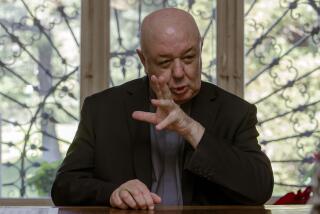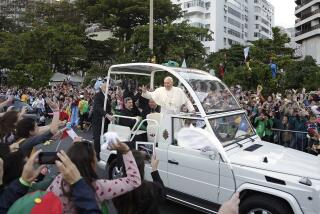A Communicator, He Set the Stage for All Future Pontiffs
Papacies are judged by standards foreign to most Americans and their media.
These days, most of our news executives have trouble looking beyond last night’s ratings or this quarter’s profit-and-loss statement. To the majority of their viewers and readers, gratification deferred is gratification denied. Rome, by contrast, reckons its appraisals by decades, its judgments by centuries and its certainties by millenniums.
Even so, Pope John Paul II appears to have fundamentally altered the papacy by revolutionizing what it is people expect of a Roman pontiff.
Despite Paul VI’s few brief and rather awkward excursions beyond the boundaries of the papal city-state in the early 1970s, modern popes generally have lived as self-described “prisoners of the Vatican” since 1870, when the armies of King Victor Emmanuel II occupied Rome and forcibly incorporated the Papal States into Italy.
John Paul shattered that reticence forever and, as a consequence of his global pilgrimages, the papacy now enjoys a moral presence -- if not always an influence -- unequaled since the High Middle Ages.
Moreover, whether it was in Warsaw or Managua, John Paul knew what to do with a stage. In part, that stemmed from the authenticity of conviction he brought to his role. It also had something to do with his formative experience as an actor in Poland’s underground avant-garde theater during the World War II Nazi occupation.
Another little-noticed aspect of his upbringing also may have prepared him for what we might call the papacy’s globalization. World War II and its aftermath subjected much of Eastern and Central Europe to what is now termed ethnic cleansing. The Poland in which the future pope was raised was a multiethnic state, peopled by Poles, Jews, Lithuanians, Ruthenians, Gypsies and Slovaks. Throughout his life, he would move easily between languages and cultures.
Future pontiffs will be judged by the standards of openness and accessibility that John Paul set. They will have to contend -- at least in the years immediately ahead -- with popular memories of his instinctual grasp of the modern celebrity’s ability to remain in some sense apart, while simultaneously making himself present to vast numbers in a way individual members of their audience find meaningful.
It’s the sort of intellectual paradox Father Karol Wojtyla, the onetime university professor conversant in such modern philosophers as Martin Heidegger and Edmund Husserl and the future John Paul II, might have relished. Few of his potential successors seem likely to share the penchant -- or the experience that formed it, though now they’re going to have to try.
Similarly, this pope understood not only the dramatic persona’s potential to communicate but was also casually at home with modern media in all its forms. He was the author of seriously regarded philosophical works, of poetry, radio plays and reflective memoirs. Most important, the camera loved him, and he understood how to reciprocate the affection with dignity.
Even his theological predilections, which inclined toward the mystic, seemed to prepare him for the virtual realities of the contemporary wired world.
The two contemporary theologians he most admired -- the French Jesuit Henri de Lubac and the Swiss Hans Urs von Balthasar -- insisted that a 20th century Catholic theology could best be expressed in aesthetic and dramatic, rather than abstract, vocabularies. John Paul began his reign deeply imbued with just such a language.
In his own 1994 collection of reflections, “Crossing the Threshold of Hope,” John Paul wrote that as a young man in Nazi-occupied Poland and after the death of his father, “I met a layman named Jan Tyranowski, who was a true mystic. This man, who I consider a saint, introduced me to the great Spanish mystics and in particular to St. John of the Cross. Even before entering the underground seminary, I read the works of that mystic, especially his poetry. In order to read it in the original, I studied Spanish. That was a very important stage of my life.... All of this drew me even more profoundly into the mystery of the church, which, precisely because it is a mystery, has an invisible dimension.”
Beyond bequeathing his successor the expectation that every pope now must in a real sense be “a grand communicator,” John Paul’s legacy may have two more immediate consequences -- one of which the media seem to be overstating.
Much is being made of the fact that John Paul named almost all the cardinals who will elect his successor. But papal conclaves tend to have a mind of their own, and, if history is any guide, the length of this papacy will not necessarily determine the character of the next pope. Far more consequential may be the electoral changes John Paul directed in his 1996 pronouncement, Universi Dominici gregis (“Of the Lord’s Whole Flock”).
In that, the pope overturned 800 years of tradition requiring a two-thirds majority to elect a pontiff. If no such majority is reached after four rounds of voting, then election may occur by simple majority.
That change opens the way for an ideologically committed bloc to forgo compromise and to simply await its chance. We should know how it all works out in a decade or so.
More to Read
Sign up for Essential California
The most important California stories and recommendations in your inbox every morning.
You may occasionally receive promotional content from the Los Angeles Times.










